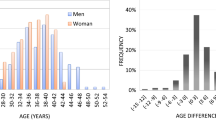Abstract
Purpose : The emotional changes provoked by the use of assisted reproduction techniques (ART) may trigger important psychological reactions. The objective of the present study was to develop a psychological evaluation test (PET–ART) in order to identify the occurrence of psychological problems and to facilitate their treatment.
Methods : A total of 128 women were submitted to PET–ART of the Center for Human Reproduction, “Sinhá Junqueira” Maternity Foundation, after application of IVF/ICSI program at least once. The causes of infertility were male-related in 45% of cases, female-related in 48%, and both male- and female-related in 7%. Infertility was primary in 79% of cases and secondary in 21%. The mean age of the women was 34.5 ± 5.2 years and the mean age of the men was 37.9 ± 6.8 years. The PET–ART was evaluated using a questionnaire with 15 questions selected in order to detect emotional reactions caused by infertility. The responses were assigned four grades with respect to intensity (1 = mild intensity; 2 = medium intensity; 3 = high intensity; and 4 = maximum or unbearable intensity). The sum of the responses corresponded to PET–ART score ranging from 15 to 60 points. The reliability of the questionnaire was evaluated by the alpha coefficient of Cronbach.
Results : The PET–ART identified five questions receiving 50% or more responses of the high/maximum intensity type (sum of the percentages of responses with a score of 3 and 4). The questions were the following: 1—The waiting time before being submitted to a pregnancy test (82.8% of the patients); 2—A negative result of the pregnancy test (77.3% of the patients); 3—The degree of anxiety in a new attempt to obtain pregnancy (76.5% of the patients); 4—Finding the money necessary for the repetition of the IVF/ICSI techniques (66.4% of the patients); 5—The possibility of collecting few eggs, or of forming or not an embryo in the laboratory is an expectation that makes me anxious (57.8% of the patients). The mean PET–ART was 33 ± 6. The alpha coefficient of Cronbach was 0.757.
Conclusions : The PET–ART was an efficient tool for the identification of women with emotional changes provoked by the application of ART and for the planning of their treatment. However, a general psychological approach was developed for each emotional factor regardless of PET–ART.
Similar content being viewed by others
REFERENCES
Boivin J, Takefman J: Stress level across stages of in vitro fertilization in subsequently pregnant and nonpregnant women. Fertil Steril 1995;64:802-810
Connolly KJ, Edelmann RJ, Bartlett H, Cooke ID, Soenton E, Pike S: An evaluation of counselling for couples undergoing treatment for in-vitro fertilization. Hum Reprod 1993;8:1332-1338
Litt MD, Temen H, Afflect G, Klock S: Coping and cognitive factors in adaptation in in vitro-fertilization failure. J Behav Med 1992;15:171-187
Slade P, Emery J, Liebermann BA: A prospective, longitudinal study of emotions and relationships in in-vitro fertilization treatment. Hum Reprod 1997;12:183-190
Edelmann RJ, Connolly KJ, Cooke ID, Robson J: Psychogenetic infertility: Some findings. J Psychosom Obstet Gynecol 1991;12:163-168
Newton CR, Hearn MT, Yuzpe AA: Psychological assessment and follow-up after in vitro fertilization: Assessing the impact of failure. Fertil Steril 1990;548:79-86
Boivin J, Takefman J: The impact of the in-vitro fertilizationembryo transfer (IVF-ET); process on emotional, physical and relational variables. Hum Reprod 1996;11:903-907
Newton CR, Sherrard W, Glavac I: The fertility Problem Inventory: Measuring perceived infertility-related stress. Fertil Steril 1999;72:54-62
Covington SN: Reproductive medicine and mental health professionals: The need for collaboration in a brave new world. Orgyn 1997;3:19-21
Author information
Authors and Affiliations
Rights and permissions
About this article
Cite this article
Franco, J.G., Baruffi, R.L.R., Mauri, A.L. et al. Psychological Evaluation Test After the Use of Assisted Reproduction Techniques. J Assist Reprod Genet 19, 274–278 (2002). https://doi.org/10.1023/A:1016566313172
Issue Date:
DOI: https://doi.org/10.1023/A:1016566313172




